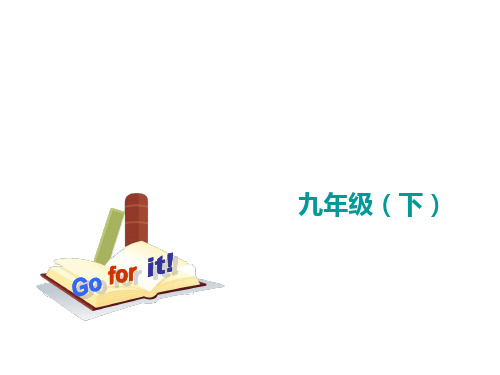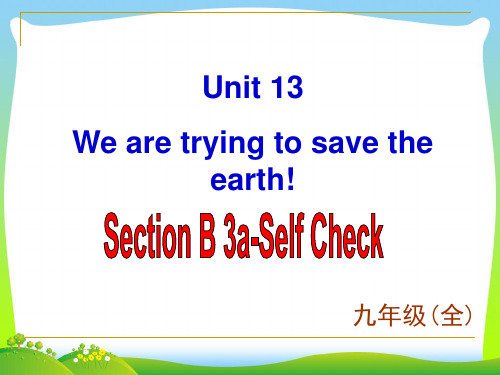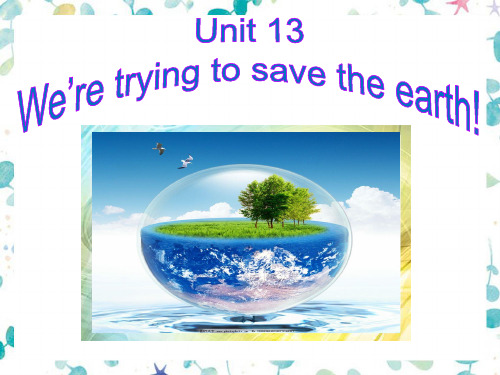人教版英语九年级下册Unit13_Section B 第3课时(1a~1e)教案与反思
- 格式:doc
- 大小:227.27 KB
- 文档页数:4



人教版英语九年级Unit13第3课时SectionB(1a-1e)公开课教案教学设计Unit 13 We're trying to save the earth!Section B(1a-1e)Teaching Aims:一、Language functions: Talk about how to protect environment二、New words and expressions:recycle, napkins, turn offWe really shouldn’t use paper napkins, you know.I know. I stopped using them last year.Teaching steps:Step I PreviewAsk the students to put the following and sentences into English orally. After that let the students write them down.Phrases:停止开车_____________ 2.再循环书本和纸张_______________关灯______________ 4.骑自行车_______________5.关淋浴____________6.停止使用餐巾纸_______________ Sentences:1.——循环用纸真的很容易。
——我同意,但是停止开车很难。
_________________________________________________________2. ——你知道,我们真的不应该使用餐巾纸了。
——我知道,去年我就停止使用了。
_________________________________________________________Step II Leading-inT: The earth is our only homeland. Do you think so?S: Yes.T: But the environment of the earth is becoming worse and worse. Let’s watch a short video about it.Play a short video about destroying the environment for the students.Step III Before-listening1. T: The earth is in danger. Do you want to save the earth?S: Yes.T: There are many things we can do to save the earth. Let’s look at the comics.T: What do you think of each way? Is it easy or difficult? Well, please rank these items from the easiest to the most difficult.After they finish, guide them to compare their answers.Step IV. While-listeningT: Well done. Let’s listen to a conversation between Julia and Jack.1. Listen for the general idea.Jack and Julia’s conversation is mainly about__________.A. how to protect the environmentB. how to save money2. Listen for the specific ideas.doing now, the things she will do in the future and the things she would never do.2d 3. Check the answers by asking the students to some full sentences according to what they’ve heard.4. Listen and complete the conversation.Jack: Hey, Julia. Don’t forget to _________ the lights. It saves electricity.Julia: Oh, I kno w. I usually do that. I was just in a hurry. How come you’re so________in the environment, Jack?Jack: I always have been. Lots of people think there’s _______they can do, but I just read this book about it, and there’r e lots of things the average person can do.Julia: Like what?Jack: Well, you should turn off the ______ when you’re washing your hair.Julia: Oh, I’d never do that!Jack: You wouldn’t?Julia: No, I have very short hair. I’m only in the shower for a few minutes.Jack: Well, every minute _______.Julia: What else does it say?Jack: It says you should take your own ______ when you go food shopping.Julia: Oh, that’s not ________. I can do that. What else?Jack: Hmmm. Here’s a good one. It says people should ________ _________ in cars and start riding ________.Julia: Oh, I’ll never do that! Can you see me riding 45 minutes to and from school every day?Jack: Well, I think the environment is really important. Besides, I like riding my bike. Julia: Yes, and you also live close to school.5. Play the tape and ask the Ss to read after itStep V. Post-listening activitiesRetellLet the Ss fill in the blanks alone. Then ask them to check the answers with their partners. Finally get two students to read the article. Check their answers at the same time.StepVI Exercises一、用所给词的适当形式填空1. Don’t _________ (use) paper napkins anymore.2. ___________(recycle) paper is good for our environment.3. We are supposed to _________(turn) off the lights when we leave the room.4. It's hard to stop _________(ride) in class.5. Julia would never _________(throw) away litter at school.二、翻译句子1.我使用毛巾而不是纸巾。


Unit 13We're trying to save the earth!本单元围绕环境保护的话题,并用主题图片表现噪音污染、空气污染、水污染等内容,目的是为了让学生对环境的破坏有一个直观的认识,从而激发学生强烈的社会责任感和对未来发展的思考。
Section A的重点是让学生掌握与环境污染和环境保护相关的词汇和句型,同时引导学生关爱动物、保护环境。
教学难点是让学生学会正确使用连词和结合生活实际讲述如何保护环境。
Section B在Section A所学的基础上,进一步谈论如何保护环境。
教学重点是让学生了解环境保护的方式,并落实到积极的行动当中,同时还有阅读策略和写作技巧的训练。
教学难点是让学生在阅读2a文章之后,根据所给词根找出衍生出的不同词汇,并理解前缀和后缀的不同用法。
The First Period—Section A(1a-2d)Teaching Important Points【教学重点】Key words & phrases:litter,bottom,fisherman,coal,ugly,advantage,cost,wooden,plasticnoise pollution,air pollution,water pollution,be full of,play a part in,turn…into,cut down air pollutionKey sentences:1.Even the bottom of the river was full of rubbish.2.It used to be so clean.3.Everyone in this town should play a part in cleaning it up.4.The air is badly polluted because there are more cars on the road these days.5.The air has become really polluted around here.6.We're trying to save the earth.Key structure:should+do;used to+do;have/has+done;be+done;be+doinge.g.Everyone should help to clean up the river.The air has become really polluted.I used to be able to see stars in the sky.The air is badly polluted.Teaching Difficult Points【教学难点】★Practice the structures to talk about pollution and environmental protection.Teaching Aids【教学工具】A tape recorder,CAI or multimedia courseware.Teaching Steps【教学过程】★Step 1Leading in【新课导入】1.Greeting2.Discussion and reviewDiscuss with the students,like this:T:What kinds of pollution are there these days?S:…T:What causes the pollution?S:…3.Review the words and expressions about the topic.★Step 2Cooperative inquiry【合作探究】1.Finish the task in 1a①Show pictures or play videos about pollution and talk about the pollution.②Read these phrases in 1a.Look at the pictures in 1a and say what they see in the pictures.Write down the words and add more words.③Ask students to say out their words in each kind of pollution.2.Finish the task in 1b①Read the instructions.Get the students to read the contents in the chart and think of what they will fill in the blanks.②Play the recording for the first time.Students listen and fill in the words.③Play the recording a second time.Ask them to check the answers.Then ask the questions.Students answer with full sentences.④Ask more questions to help students learn more details.Then play the recording for the students to role-pay the conversation.3.Finish the task in 1c①Show the key words of the conversation.Ask students to retell the contents in the chart.Like this:What:dirty;bottom,rubbish;fishWhy:littering,putting wasteHow:write to,close down;help to clean up②Read aloud the model dialogue in 1c.Then in pairs,do the oral practice with more words.③Ask two pairs to perform in class.4.Finish the tasks in 2a-2b①Use PPT or pictures to show the four kinds of pollution.Get the groups of students to havea competition to say words about the pollution one by one.land pollution:…air pollution:…noise pollution:…water pollution:…②Get the students to write down these words in their notebooks.③Play the recording for the first time.Students listen and circle the kinds of pollution.Check answers with the class.④Read the sentences in 2b.Predict the contents they will fill in.Play the recording.Students listen and complete the sentences.⑤Play the recording again.Check the answers with the whole class.5.Finish the task in 2c①Read the sample conversation in 2c.Then Read the listening materials and discuss in pairs what causes the two kinds of pollution.②Students work in pairs,making dialogues.③Ask three pairs to role-play their conversations to the class.6.Finish the task in 2d①Talk about the picture in 2d.Ask:What are your ideas for solving the air pollution/waste pollution problem?Present the new words in the conversation.Such as,coal,advantage,wooden,plastic,takeaway,bin,…②Read the conversation in 2d quickly.Find out the problems about environmental pollution in the dialogue.③Read the conversation again.Ask the students to find the ways to solve the problems of air and waste pollution.④Read aloud the conversation by the recording.⑤Learn the useful expressions:What are your ideas for doing…To cut down air pollution,we should…So together,our actions can make a difference and…⑥Role-play or read the conversation in pairs until fluently.★Step 3Homework1.What are your ideas for solving the waste pollution problem?2.Write the words about the four kinds of pollution.3.Translate the following sentences into English.(1)我们正在想办法拯救地球。

Unit 13 We’re trying to save the earth!Section B (1a~2e)教学目标【知识与技能】1.掌握本课单词和短语:recycle, napkin, upside, gate, bottle, president, inspiration, iron, work, metal, creativity, throw away, put sth. to good use, pull…down, bring back2. 掌握本课语法:能正确运用现在进行时,现在完成时,被动语态,情态动词和used to 句型。
【情感、态度与价值观】有环境危机意识,学会关注环境保护环境。
教学重难点【教学重点】掌握句型:1)能正确运用现在进行时,现在完成时,被动语态,情态动词和used to 句型。
2)保护环境的措施方法。
【教学难点】能正确运用现在进行时,现在完成时,被动语态,情态动词和used to 句型。
教学过程Step 1 RevisionRole-play this conversation.A: I think that everyone should use public transportation.B: I disagree. It’s difficult for parents with young children to use public transportation…A: But we can do other things. For example, we can go to school on foot.B: You are right. We should turn off the lights when we leave the room.Step 2 Lead in(1) Tell students we should do these things to protect the environment.Turn off the lights when you leave a room;Stop riding in cars;Stopping using paper towels or napkins;Recycle books and paper.Turn off the shower while you are washing your hair.You can help reduce pollution by putting that soda can in a different bin.Don’t use paper napkins.(2)What can we do to help save the earth? Rank these items from the easiest (1) to the mostdifficult(5). (1a)______stop riding in cars______recycle books and paper______turn off the lights when you leave a room______turn off the shower while you are washing your hair______don’t use paper napkins(3) Compare your answers in 1a with your partner.Step 3 ListeningListen and check (√) the things that Julia and Jack talk about.(1)Check ( ) the things that Julia is doing now, the things she will do in thefuture and the things she would never do.(2)Check the answers with the whole class.(3)Listen again and answer the questions below.①Who read a book?②Would Julia turn off the shower when she is washing the hair?③Does Jack live close to school?Get one student to write the answers on the blackboard.Keys: Jack.No, she would never do that.Yes, he does.Step 4 Practice(1)Make a conversation using the information from the chart in 1c. Say what istrue for you.(2)Guessing gameShow some pictures to students and get them to guess what these thingsare made from.Step 5 ReadingUse pictures to presentation the new words.Read the passage and answer the questions below①Who is Amy Hayes?②How many people are mentioned in the passage? Who are they?Keys: She is a unusual woman in the UK.Three. They are Amy Hayes, Jessica Wong and Wang Tao.Keys:Amy Hayeswindows and doors of old buildings that have been pulled downan old boatrocksold glass bottles(n.瓶子)a houseJessica Wongold clothes; especially old jeansbagsWang Taoiron (n. 铁) and other materials from old carsbeautiful art piecesRead paragraph 2 and answer the questions.①Did she win an award? What was it from?②Where did her windows and doors come from?③What does the sentence “she lives in a house in the UK that she built herselfout of rubbish” mean?Keys:Yes, she did. It was from the Help Save Our Planet Society.They came from old buildings around her town that were pulled down.她住在英国,房子是她自己用废弃物建造而成。
Section B 第3课时(1a~1e)物以类聚,人以群分。
《易经》
原创不容易,【关注】店铺,不迷路!
类别学习重点
重点单词recycle
重点短语turnoff,rideincars
重点句式1.Recyclingpaperisreallyeasy.
2.Butit'slastyear.
课前预习写一写回收利用;再利用recycle
译一译 1.关掉turnoff2.付费payfor3.采取行动takeaction 背一背
1.回收再利用纸很容易。
Recyclingpaperisreallyeasy.
2.但是停止坐车很难。
Butit'shardtostopridingincars.
3.我们不该用餐巾纸。
Weshouldn'tusepapernapkins.
新课展示
考1c方框中的信息)
【语法提要】
1.stopdoingsth.与stoptodosth.的区别
(1)stopdoingsth.意为“停止做某事”,指停止正在做的事。
例句:Pleasestoptalking.It'stimetosleep.请停止讲话。
到睡觉的时间了。
(2)stoptodosth.意为“停下来去某事”,指停止正在做的事去做另外一件事。
例句:Wehavebeenworkingforawholeday.Let'sstoptohavearest!我们已经工作了一整天了。
让我们停下来休息一会吧!
2.动名词作主语
动名词作主语往往表示经常性、习惯性的动作,在口语中也可以表示具体的动作,谓语动词常用第三人称单数。
例句:Seeingisbelieving.眼见为实。
Recyclingpaperisveryeasy.回收利用纸张很容易。
新课展示【问题探究】
1.Myuncleisanevironmentalist.alsisveryimportantnow.
活学活练(B)1.Youlooktired!Youshouldstop______yourworkandhaveagoodrest!
A.todo
B.doing
C.todoing
D.do
(D)2.(云南曲靖中考)
vegetablejuiceisagoodhabit,whichhelpsyoukeepablanceddiet. A.DrinkB.DrankC.DrunkD.Drinking
布置作业:教师引学生课后完成本课时对应练习,并预习下一课时内容。
教学反思
本课时让学生初步欣赏了英文诗歌,通过教师的引导,学生完全理解了本诗歌,也掌握了重要的语法知识。
教学过程中老师的疑问:
教师点评和总结:
【素材积累】
阿达尔切夫说过:“生活如同一根燃烧火柴,当你四处巡视以定自己的位置时,它已经燃完了。
”有选
择就会有错误,有错误就会有遗恨,但即使第一步错了,只要及时地发现并纠正,未必步步都错下去。
峰回路转,柳暗花明,路断尘埃的时候,自己给自己一双翅膀;厄运突降的时候,自己给自己一个微笑;雨雪连绵的时候,自己给自己一份责任和梦想。
天下路都是相连的,沿着心中的路坚定地走下去,同样能抵达你想要去的地方。